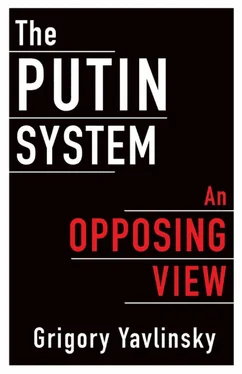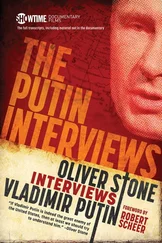Whether this attempted revenge will be successful—that is, whether it will lead to a long-term core-periphery realignment favorable to Putin’s Russia—is primarily an issue of internal vulnerabilities of the core, of the US and Western European democracies, which are exposed through the weakening of their democratic institutions and value systems. This weakening has been a matter of concern for quite a while, as it increasingly fuels global uncertainty and chaos, a crisis of confidence in the future of our world, and even apocalyptic expectations in place of a compelling vision of sustainable development.
There is plenty of evidence that this weakening is rooted primarily in the decay of civil society institutions, as seen in the declining influence and shrinking material resources of labor unions, nonprofits, local self-government, political parties, and so on. In recent decades, this retrenchment of civil society has been described and analyzed from different perspectives by leading political thinkers, starting with Harvard University’s Robert Putnam, in his now classic work Bowling Alone . [2] Robert D. Putnam, Bowling Alone: The Collapse and Revival of American Community (New York: Simon and Schuster, 2000).
There are many reasons to agree with those who see the retrenchment as caused by dramatically rising economic inequality and the decline of the middle class, unleashed by the neoliberal economic agenda that spread like fire from the United Kingdom and the United States to what was then still the Soviet bloc and that has dominated since then. This, in turn, resulted from the triumph of the ideology of self-regulating markets and the allegedly spontaneous social order generated by them, which is devoid of any value judgment about their social impact.
To summarize, the weakening of Western democratic institutions is a long-term trend that emerged well before Moscow’s interference in Western countries’ internal politics. Actually, the weakening made the interference possible, even though, in a vicious circle of sorts, Moscow’s interference may have exacerbated the damage to democratic institutions and values.
Thus, without a major awakening of Western societies and their power holders, the impact of such interference may go far deeper than we can imagine today. Not only do Western countries need to be cognizant of the dangers posed by even the possibility of a peripheral authoritarian regime interfering with their electoral processes, but also, no less importantly, they must be aware of their own internal vulnerabilities vis-à-vis the resurgence of authoritarian tribalism fueled by glaring economic inequality. In this case, the corrosion of the institutions of national and global governance can become potentially irreversible, undermining our ability to generate rational solutions to life-and-death issues of the day, from military defense to the planetary threat of human-generated climate change. Meanwhile, the disintegration of the US-led unipolar world order and the failure of multipolarity increase the likelihood of a major war with catastrophic consequences for our civilization.
I am deeply convinced that the single most powerful weapon of Western self-defense against this scenario is the resilience of the West’s democratic institutions and their ability to prevail over their own internal threats of authoritarian degeneration. One of the remaining key differences between the core and the periphery, in this instance, is that the core has internal resources for such a transformation and revival, while any similar developments in a peripheral or semiperipheral country like Russia depend upon the impulses from the core. Today, therefore, the possibility of a less authoritarian, less xenophobic, and overall less dangerous Russia primarily hinges upon the resurgence of democratic political and civic institutions in the West and their ability to resist and to prevail in the ongoing struggle against their own domestic authoritarianism, neo-Nazism, racism, and other forms of bigotry and hate, and to subsequently transform the international agenda.
While democrats and progressives in Western societies are fighting this out, I urge them to not underestimate the additional strength that they will gain through substantive and meaningful relationships with their counterparts in countries such as Russia. Even though, with regard to their ability to change government policies, civil societies and antiauthoritarian forces in these countries are many times weaker than those in the West, they are by no means insignificant in terms of being able to generate or speed up their own societies’ supportive responses to new signals coming from the core of the world system. Furthermore, some of these antiauthoritarian forces in peripheral and semiperipheral countries have developed unique practices of survival and nonviolent resistance. These practices may very well be both transferable and beneficial to American society, in response to the increasing attempts to transfer some of the features of Russia’s peripheral authoritarianism to America’s political landscape.
Russia’s United Democratic Party Yabloko, which my colleagues and I founded in the fall of 1993, has been dedicated to serving as an antiauthoritarian force in Russian society. In fact, it is Russia’s oldest currently functioning political entity to trace its origin and inspiration to the most recent round of Russia’s attempts to rebuild itself and its civilizational identity as part and parcel of the European community of democratic nations. Thus, we envision Yabloko as poised to be a carrier and transmitter of active institutional memory about the achievements of the late 1980s and the early 1990s to the present and the next generation of politicians. The end of the Cold War created opportunities for improvement not only in Russia’s domestic affairs but also in Russian–American relations—what was known back then, in American political parlance, as the “peace dividend.” We strive to advocate for such opportunities to be resurrected, once Putin’s rule ends, and to accomplish what must be done for both countries to take better advantage of these opportunities for mutual benefit.
Yabloko has continuously campaigned against the Kremlin’s military interference in Ukraine and in Syria. We believe that, in both cases, the Kremlin has taken the wrong side of history and has been wasting Russia’s precious human and financial resources. Likewise, we are firmly opposed to the Russian authorities’ attempts to interfere with the domestic politics of the United States and Western European countries, whether through cyber warfare or by corrupting government officials and entire political parties, just as we objected to the instances of foreign interference in Russia’s domestic politics, including in the 1996 presidential elections, on the side of Boris Yeltsin and his neoliberal market reformers—interference that partly paved the way for Putin’s rise to power.
Yabloko’s stand on Russian–Ukrainian relations is that Russian authorities must acknowledge that their annexation of Crimea violated international law. This is the key step toward any subsequent international negotiations that would ensure Ukraine’s territorial integrity while safeguarding the interests of the population of Crimea in accordance with international law. Moscow also must stop supplying arms and equipment to secessionists in Eastern Ukraine and reach an agreement on the deployment of UN peacekeepers in the region.
We also urge the end of Russia’s participation in Syria’s civil war. Russian involvement has caused the loss of tens of thousands, if not hundreds of thousands, of peaceful Syrian lives, has fueled terrorism in the region, and has turned into a geopolitical trap for Russia itself. As part of our nationwide campaign to bring Russian servicemen home from the war zones, we held street actions in forty-seven cities and in thirty-eight out of Russia’s ninety regions. More than one hundred thousand Russians have signed our petition to bring Russian troops back from Syria, and polls show that, during the five months of our campaign, the share of those polled who are opposed to Russia’s participation in this war has grown from 34 percent to 49 percent—and we know that many more do not disclose their views to pollsters out of fear. Meanwhile, Yabloko’s representatives in regional legislative bodies have introduced a federal bill that would limit presidential war powers and have been urging these regional parliaments to use their right of federal legislative initiative to move this bill forward.
Читать дальше












